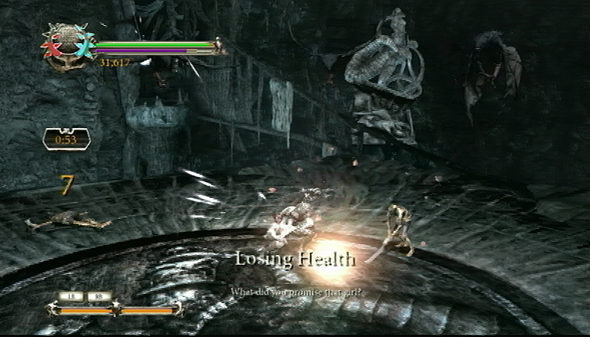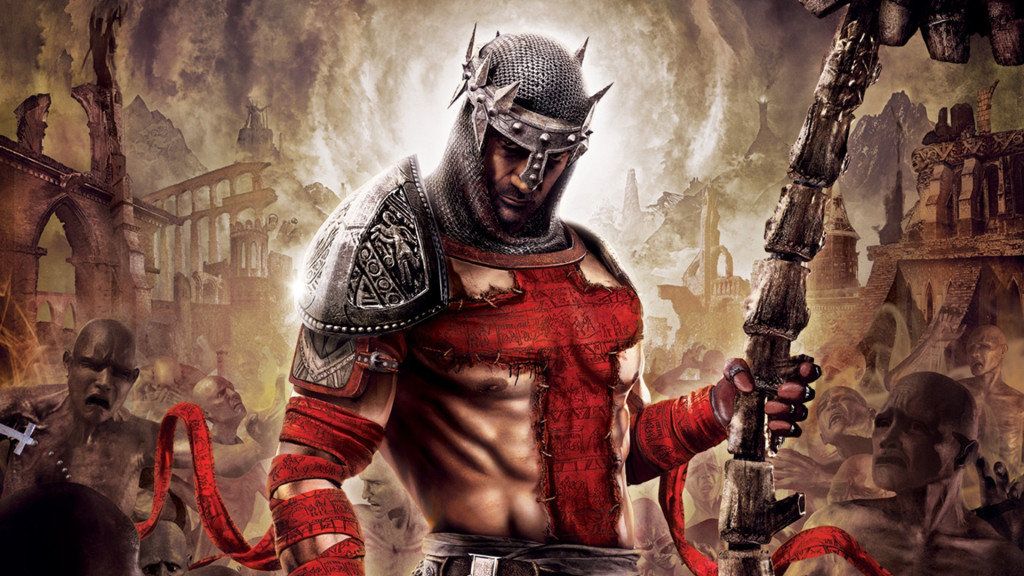10 For we are His workmanship, created in Christ Jesus for good works, which God prepared beforehand so that we would walk in them.
Ephesians 2:10
I believe, rather solidly and definitively, that video games only hold you by their aesthetics for only so long. I know plenty of games that strike you with their art styles, but immediately falter. I prefer that experience to something far worse when the game’s flaws become apparent to the player in the last vestiges of the developer’s intended pathway.
Many people cite Dante’s Inferno and the Malebolgia (eight circle) section, which places a series of arena-based challenges into the game which highlight its flaws in both mechanical variety and lazy design (from the book, there’s ten ditches or malebolge, so I can’t imagine what exactly lies in store). This Ryan Davis video (RIP) probably makes it more plain.

At that point of frustration, imagine that all that exists rests in the game’s challenge and the abilities on hand. Who cares whether ability X or enemy Y looks like an evil dead baby fetus, or that everything offends your sense of visual style? Honestly, those don’t matter; now the game presents you with a difficulty you must overcome. Or, as Ben Ruiz, developer of Aztez says about it (sorry to quote so much, but he says it better than I:
…the right beat ’em up (I can’t stress this enough; you have to be playing certain ones) is pitting your mental resources against a gigantic array of obstacles in the form of simulated opponents. Overcoming them means you have successfully utilized your mental and physical resources. This feels good physically because you have defended yourself (even in simulation) and your body wants you to know that.
Now this is where a lot of you say “But I’ve never experienced a sense of pleasure playing a beat ’em up that was non-trivial”. That’s most likely because you’ve only played them on the most basic level. You got thrown the beginner’s hand and you squashed it. Which is awesome! But this is where I implore you to dive back into that super difficult beat ’em up you’ve never completed, and/or crank up the difficulty on that beat ’em up you really appreciate but never bothered to master. And when I say “master”, I mean that you can express yourself with grace, agility, and power against whatever the game throws at you. That sense of pleasure you get defeating simulated opponents gets very real when you elect to go down the rabbit hole of difficulty. Play Devil May Cry 3 on “Dante Must Die” mode, or play Bayonetta on “Non-Stop Infinite Climax” mode, and do it until you’re successful. I assure you, you’ve never experience anything like this.
You stop breathing. The game environment melts away into an abstraction of floors and corners. Enemies lose their textures and become silhouetted gray decks of mechanical cards. The audio vanishes. The only thing you can perceive is the motion of bodies and the rippling flare of frames-long weapon effects. Your body ceases to exist and you become the combat.
I love the designs of said character action games myself, but they’re just an initial attraction. What will keep you in the relationship? The obstacles placed in your path, augmented by the tools which the game provides to overcome those obstacles. Multi-tasking, hand-eye coordination, and game knowledge combine as the game itself melts away. All that exists is the mechanics, and as a sports player enter “the zone”, the video game players suddenly finds themselves nearly melded with the game.
When someone interrupts this, I can assure you it’s not a pleasant experience. Thanks, family members! I didn’t want to beat that boss, really! Just walk in front of the screen while I try to win! I have zero emotional investment in what’s happening on screen right now!

Have you often had this experience in a video game? How often? Not often at all, or a lot? In the modern video game world, I imagine this experience of total immersion into the game rarely occurs. Many of our “artistic” works force us into a mode of contemplation rather than immersion, and that often forces us into the model of other mediums.
To continue the Dante’s Inferno comparison, I read the entire Divine Comedy recently and have come to enjoy its subtle quirks through long period of study. While Alighieri’s poem works in terms of contemplative interplay between verse, theology, and Dante’s historical context, that doesn’t translate well into a video game. Thus, Visceral Games made a judgment call and changed some of the details. Dante isn’t a Pilgrim but a Crusader; Beatrice isn’t the heavenly embodiment of Wisdom but a common woman from Florence (who dresses like a scandalous woman from Florence, as Dante actually notes in the Inferno canticle). Does this work better on a popular level? Absolutely it does! It makes the poem much more accessible without a huge background of knowledge, and also immerses players in the experience of one team’s inspired take on Hell (for better or worse, depends on your sensibilities).
So, while Dante’s Divine Comedy encourages a wonderful, footnote heavy, and contemplative great read for believer and non-believer alike, I can’t say it makes for great video game material unless 1. the audience understands Greek and Roman mythology, 2. understands, however vaguely, scholastic theology in the vein of Thomas Aquinas, 3. assumes the Christian viewpoint of the universe or can place themselves into that context, and 4. Can deal with arcane theological conversations and obscure Italian figures from the 14th century in constant reference to a time and place in which, without proper study or reading, no one in modern culture could possibly know or even learning from anything but a college course specifically designed to cover Dante’s works (including the Vita Nuova, and that’s a whole other issue!). What makes good literature and good video games don’t often compute.

Dante’s Inferno The Video Game, on the other hand? Dante’s a bad guy going to a bad place, and you need to travel through Hell with Virgil’s help. This is, even without me playing it, simple, to the point, and it lets the mechanics talk as a metaphorical/allegorical take on the dialogue-heavy interplay of the poem while taking advantage of a video game’s ability to subsume the player into its mechanical depths (heck, it’s even got absolution and judgment options for lost souls).

This is why video games that take advantage of being games rather than books, movies, or other entertainment media last far longer in our consciousness: they engage, they encourage play, and they’re often strange and weird (see: Super Mario Bros.). Video games have always been weird and subcultural; only recently did they come under attack for going against the grain.
So it is also that Christ subsumes us into Himself. We are His children, whatever they might say. Notice Paul’s word choice here (as the New American Standard Bible puts it) that we walk “in” Him:
6 Therefore as you have received Christ Jesus the Lord, sowalk in Him, 7 having been firmly rooted and now being built up in Him and established in your faith, just as you were instructed, and overflowing with gratitude.
Colossians 2
That’s such a strange concept. We do not seek to just emulate Christ (1 Peter 2:21 ), or just become like Him. (Ephesians 5:1-2 ). We walk in Him, before God the Father the same in Him with the aid of the Holy Spirit to guide us. The divine eternal mystery of the Trinity still exists, of course, but none can deny that Christians are subsumed into the Body of Christ. We are not many, but One.
And that’s such a hard thing to do, but an easy thing to say, yet I do believe it is possible to forget all the aesthetic appeals of life, to see them as the farce they are, and then submit to the God who know all and sees through us with a piercing glare that we could not stand but for the love of Christ. For, as we know:
29 For those whom He foreknew, He also predestined to become conformed to the image of His Son, so that He would be the firstborn among many brethren
Romans 8
